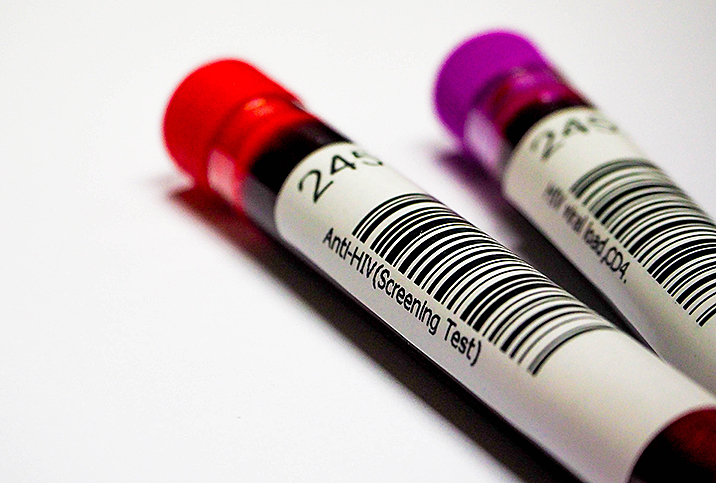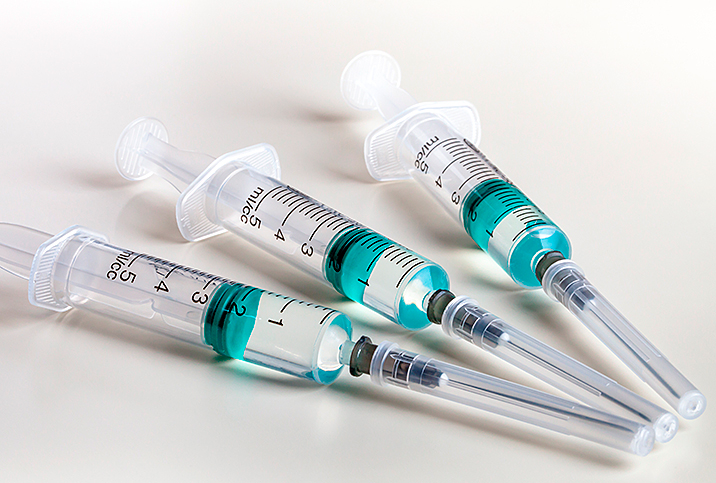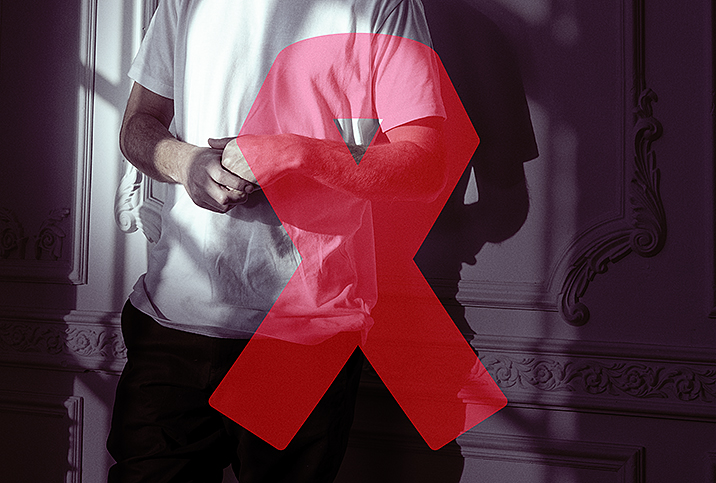Needle Exchange Programs—Vital For Fighting HIV—Are Under Attack

There's a brewing backlash against needle exchange programs in America. The last month alone has seen local politicians call for Indiana's program to be shuttered, despite it playing a key role in tackling a 2015 HIV outbreak, and in Atlantic City, Council President George Tibbitt introduced an ordinance to shut down the Oasis Drop-In Center, launched by the South Jersey AIDS Alliance in 2006 and currently the only program of its kind in the city.
Before this recent wave of opposition, harm-reduction advocates were buoyed by support from U.S. President Joe Biden's American Rescue Plan of 2021, which pledged "$30 million to support community-based overdose prevention programs, syringe services programs and other harm-reduction services." The CDC also advocates for these services. "We know from prior research that SSPs can lead to reduced syringe sharing, lower infection risk and reduced incidence of both HIV and hepatitis C among people who inject drugs," a CDC representative explained. "When combined with medication for opioid use disorder, HIV and HCV transmission is reduced even further, by over two-thirds."
In the face of Biden's endorsement of harm-reduction programs, Republican-led areas have amped up their opposition to needle exchanges over the last few months, arguing that these programs create syringe litter, enable drug use and drive up overdose deaths (contrary to evidence—more on that later).
To say that needle exchange programs have long been controversial would be an understatement. Throughout the 1980s, AIDS activists fought to establish these sites where injectable drug users (IDUs) could freely obtain clean syringes and discard used needles. By 1983, Yale medicine student Jon Stuen-Parker had become one of the most vocal and proactive American advocates, establishing an informal (and then-illegal) needle exchange network in New Haven, Connecticut, where IDUs made up approximately 80 percent of AIDS cases at the time.
Despite stigma and criminalization—by 1995, Parker had been arrested 43 times for his advocacy—the needle exchange program was legitimized in 1990, after years of advocacy led to a bill exempting the program from laws that made needle possession a crime. Yale professors later conducted research that found that, during its first year, the program had "reduced the incidence of new HIV infection by 33 percent." Research was scarce throughout the 1980s and 1990s, but today's data paints a clear picture—in 2016, a systematic review of 15 studies on needle exchanges found that they were "associated with decreases in the prevalence of HIV and HCV [Hepatitis C Virus] and decreases in the incidence of HIV," according to a Centers for Disease Control (CDC) report.
Now, these hard-won gains are being stripped back by opponents of needle exchange programs—also known as syringe services programs (SSPs)—but proponents of these services are fighting back.
Contrary to supporting evidence, needle exchange programs aren't especially popular among members of the public. A 2018 study found only 39 percent of 1,004 Americans surveyed supported legalizing syringe services programs in their communities.
Activists at the New Jersey Harm Reduction Coalition (NJHRC) have relentlessly campaigned to save the Oasis Drop-In Center, highlighting its importance in the fight to lower HIV rates and the safety it offers injectable drug users. "I've always thought of Oasis as an amazing resource," explained Caitlin O'Neill, a founding member of the coalition. "They offer everything from meals, showers and laundry access to staff nurses, who can do wound care or offer private consultations."
Oasis is also the only non-police-led service in the city to provide Narcan, also known as naloxone, a life-saving drug known to block the fatal effects of opioid overdose. Of the 565 municipalities in New Jersey, only seven have harm-reduction centers where such services can be accessed, meaning those in rural areas are forced to travel for hours or simply miss out.
According to reports in the Philadelphia Inquirer, Tibbitt and his colleagues also cited "syringe litter" and "the program's impact on quality of life" as justification for the ordinance, but O'Neill explained that "[Oasis] has a 98-99 percent exchange rate"—meaning that almost all needles were being safely disposed of and replaced with clean ones—and that "staff do syringe sweeps across the city three times a week." When Oasis workers suggested litter disposal kiosks could be scattered across the city, O'Neill said their ideas were firmly rejected. "We kept hearing, 'This is a tourist city,'" she continued. "There's this notion that if you don't see something, it's not happening."
O'Neill remains firm in her support for the programs. "The numbers don't lie—your people are healthier, your [transmission rates] are lower, and your city is not having an HIV outbreak," she said. Ironically, Indiana's 2015 HIV outbreak was exacerbated by then-Governor Mike Pence's reluctance to allow SSPs to operate—a 2019 study published in Clinical Infectious Diseases estimated that earlier implementation of harm-reduction services would have averted around 90 percent of cases.
Contrary to this evidence, needle exchange programs aren't especially popular among members of the public. A 2018 study published by John Hopkins Bloomberg School of Public Health found "only 39 percent" of 1,004 Americans surveyed "supported legalizing syringe services programs in their communities," and "respondents who had negative views about these strategies also tended to have very negative views of opioid users."
Research suggests this might be due to a lack of education. A 2019 study published in the Journal of Community Health surveyed the residents of rural Virginia and found that "low levels of knowledge and high levels of stigma" drove the local pushback against needle exchange programs. To help educate the public, the CDC publishes an up-to-date fact-checking list clarifying that no evidence has linked exchanges to increased crime rates or illegal drug use.
"Closing safer needle and syringe programs does not, in any way, prevent drug use," a representative for the U.K.'s National AIDS Trust said. "In fact, they have been crucial in the fight to control HIV cases among people who inject drugs in the U.K. They are a vital component of a harm reduction approach to drug use, for which there is mounting international evidence."
A handful of countries have even tried forward-thinking alternatives to SSPs: According to global HIV non-profit organization Avert, syringe vending machines are commonplace in Germany, Italy, Ukraine, Australia and the Netherlands.
But O'Neill said advocating for these programs in America is a mammoth task, especially when politicians turn a blind eye to the evidence. "We're just asking for the state to give [marginalized groups] the respect they give other communities," she said. "Ultimately, the message that taking away resources like these sends is that, in the eyes of bureaucrats who choose to dehumanize us, we are disposable."

















